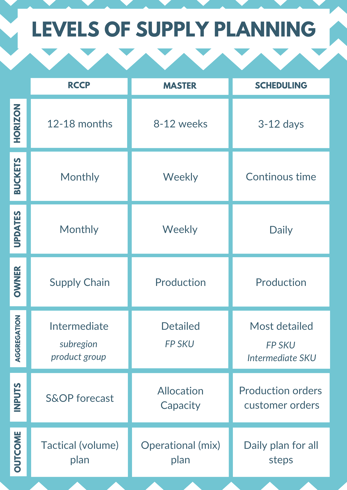
Recently, our Arkieva* colleagues received a question about the difference between RCCP and MPS. Since this is also a frequently asked question in our network, we decided to highlight some differentiators in this blog!
*Solventure is the proud European implementation partner of Arkieva, an award-winning Advanced Planning System which is also listed in the Gartner Magic Quadrant for Supply Chain Planning Solutions.
Where the RCCP (Rough-Cut Capacity Plan) is a monthly process, looking 12-18 months out, in monthly buckets, the MPS (Master Production Schedule) or master plan is typically in weeks. A typical horizon is 8-12 weeks out, but as explained in our Solventure white paper, it really depends on the cumulative production and supplier lead times.
The key decision in the master plan is getting the mix right, within the allocated volumes decided by the RCCP. The RCCP has decided which aggregated volumes will be sourced from where and whether to build up inventory. The MPS has to translate that monthly plan into a weekly production plan and on an SKU level. In planning the mix, it will account for variances in run times, try to group products in campaigns to minimize change-overs, and specify in which SKUs to build the required inventory. It will also manage and prioritize different demand streams consisting of customer orders, forecast, or safety stock replenishments. Depending on the flexibility it may fine-tune capacities like the amount of overtime and temporary labour.

How do you get to an efficient planning process on these different levels? Jumping directly to an SKU level MPS calculation can be hard for an organization to absorb. So it is a good idea to proceed in steps. The steps you need to take are fully explained in Arkieva's blog RCCP vs MPS or our Solventure white paper on Supply Planning. Make sure to check it out and bring your planning process to the next level - pun intended 😉.
Discover how you can determine the right planning horizon based on your complexity and maturity in our whitepaper about the wonderful world of Supply Planning!
These Stories on Supply Planning